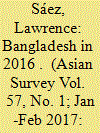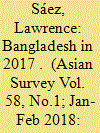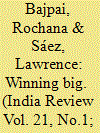|
|
|
Sort Order |
|
|
|
Items / Page
|
|
|
|
|
|
|
| Srl | Item |
| 1 |
ID:
152241


|
|
|
|
|
| Summary/Abstract |
The year 2016 was challenging for Bangladesh. Although there are promising signs of a transition toward upper lower-income status, there is sufficient political instability at the margins to warrant concern. The capstone political event was the July terrorist attack in Dhaka, which many feared might represent the first clear metastasized imprint of the Islamic State (ISIS) in Bangladesh.
|
|
|
|
|
|
|
|
|
|
|
|
|
|
|
|
| 2 |
ID:
160401


|
|
|
|
|
| Summary/Abstract |
Bangladesh experienced a turbulent year in 2017, largely as a result of damaging floods. Moreover, the flood of Rohingya refugees in the second half of the year added considerable strain to Bangladesh’s political economy. There are worrisome signs that the Bangladeshi state is using a range of institutional and extrajudicial mechanisms to stifle political opposition.
|
|
|
|
|
|
|
|
|
|
|
|
|
|
|
|
| 3 |
ID:
184780


|
|
|
|
|
| Summary/Abstract |
Politicians winning elections with large margins of victory, beyond what is necessary to win electoral contests,what we term “winning big”, is a common, yet under-studied phenomenon across the world. Political economy models suggest that winning big is not an optimal allocation of scarce campaign resources in a SMP/FPTP electoral system. Inductive inquiry shows that incumbent politicians likely to win nevertheless campaign hard, often devoting considerable effort and resources, for reasons that remain unexamined. Focusing on India, this article explores a range of reasons that can help explain this phenomenon through an innovative research design that combines quantitative analysis with in-depth elite interviews with incumbent MPs from 10 states. We distinguish the phenomenon of “winning big” from that of “safe” seats,identify and probe factors that can contribute to large margins, including candidate strategy, party popularity, mobilizers, electoral uncertainty, and party control . Our findings suggest that while political parties in India, as elsewhere, do not spend more money on electoral contests that they likely to win comfortably, winning big can be the result, among other factors, of a party strategy to establish a reputation for invincibility, and/or individual efforts, stemming from a sense of political vulnerability felt by politicians, underestimated in the literature on safe seats.
|
|
|
|
|
|
|
|
|
|
|
|
|
|
|
|
|
|
|
|
|